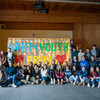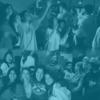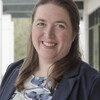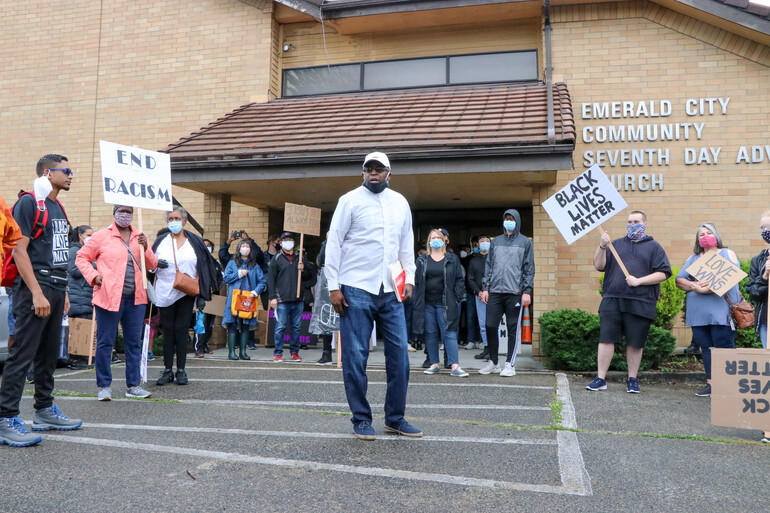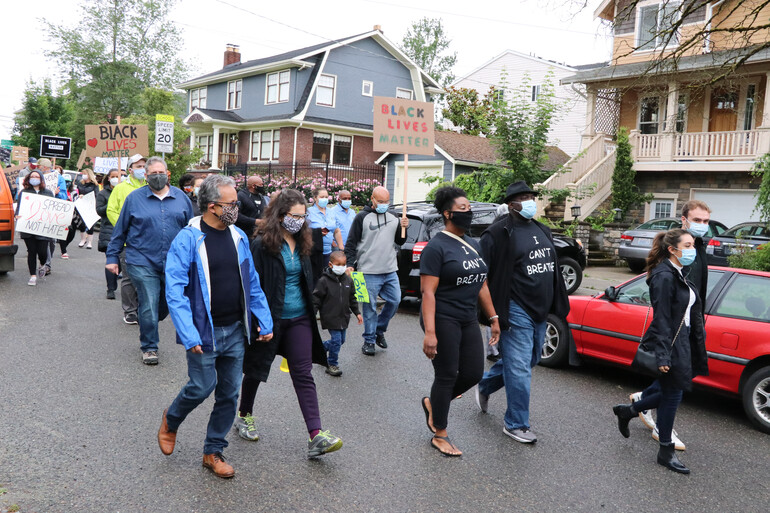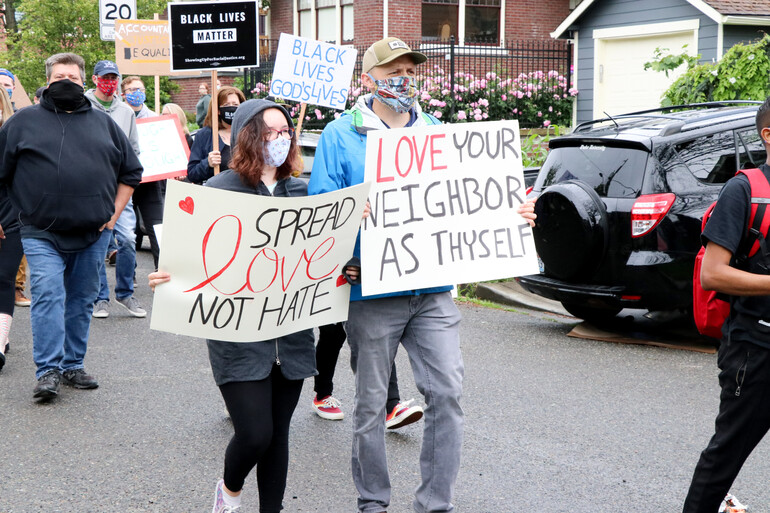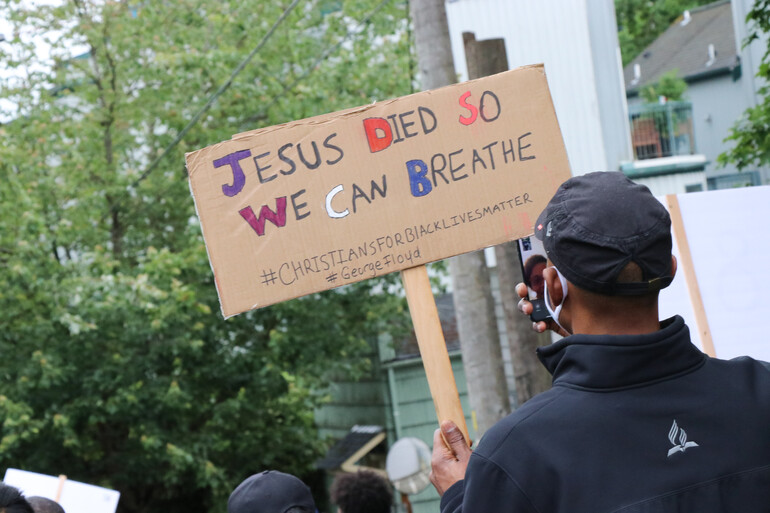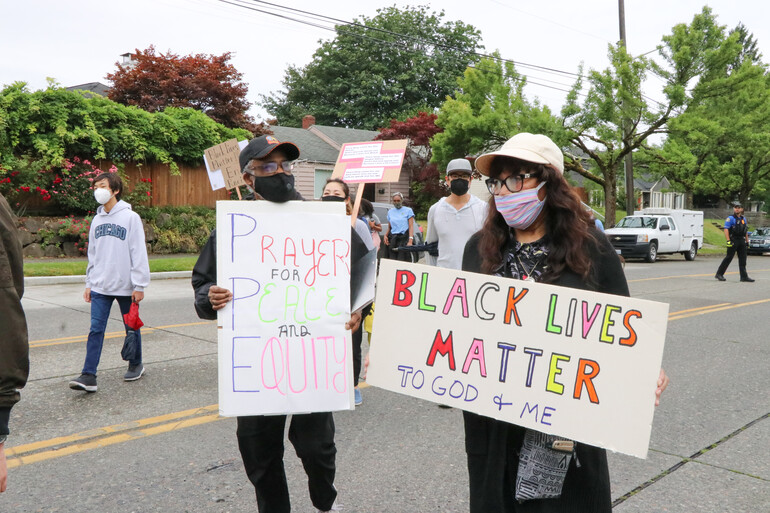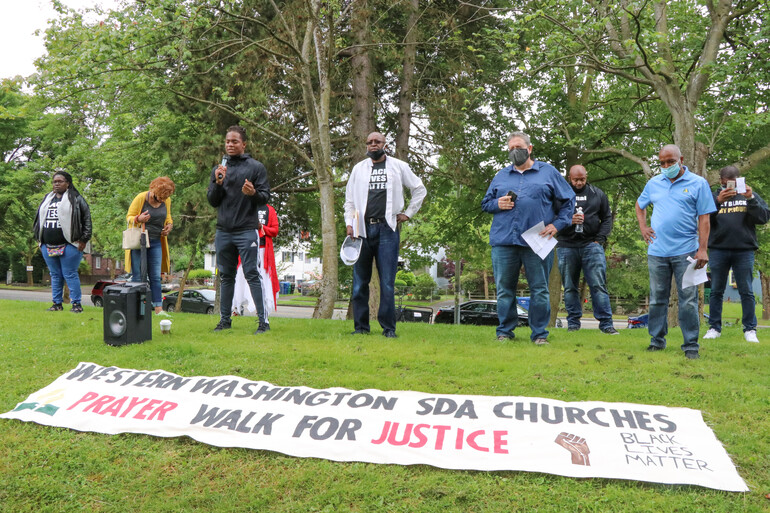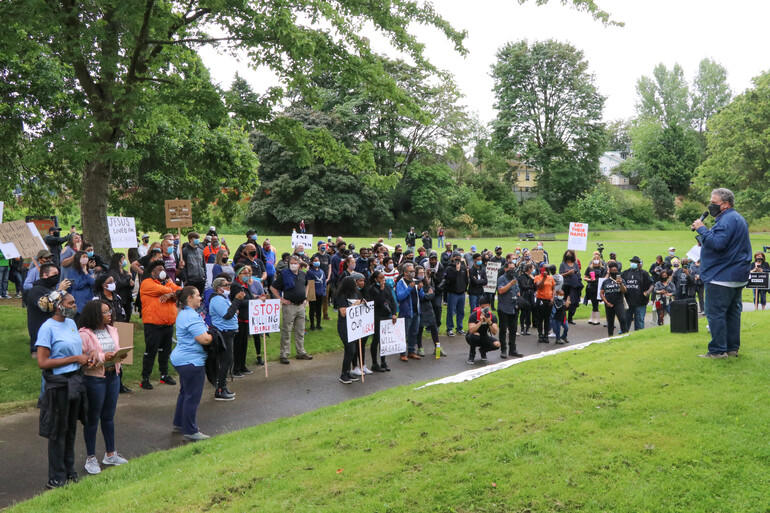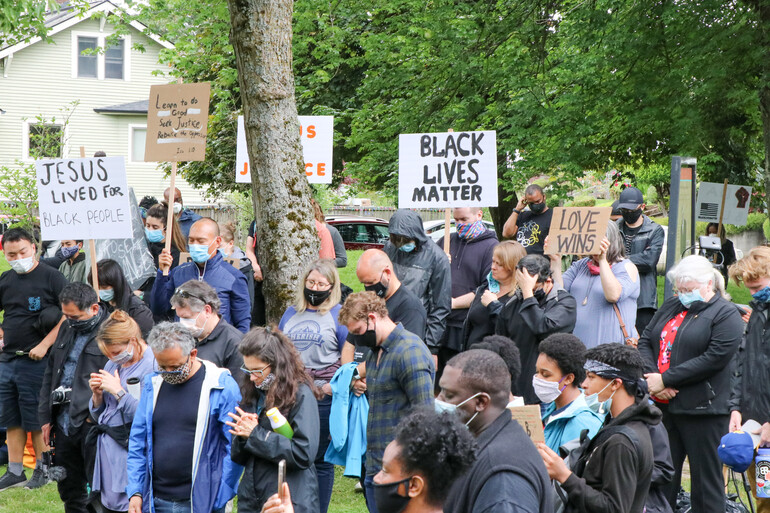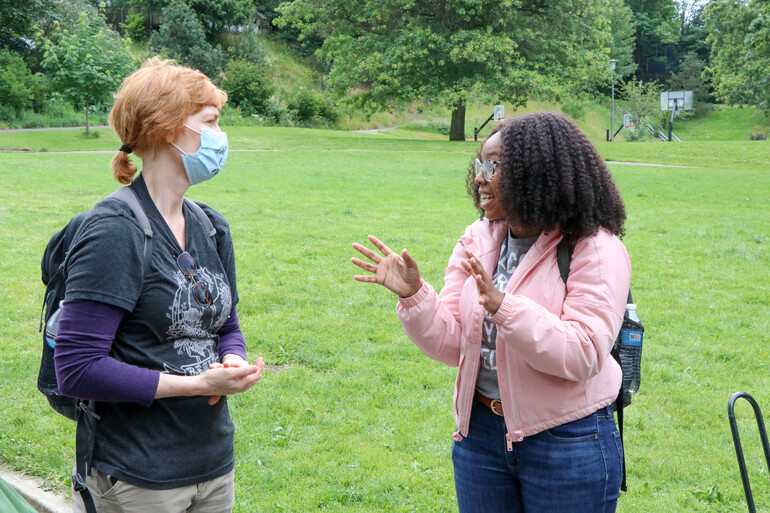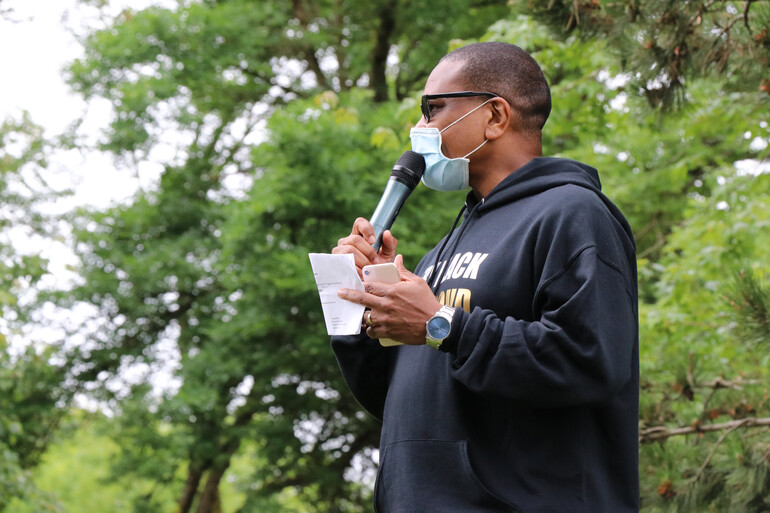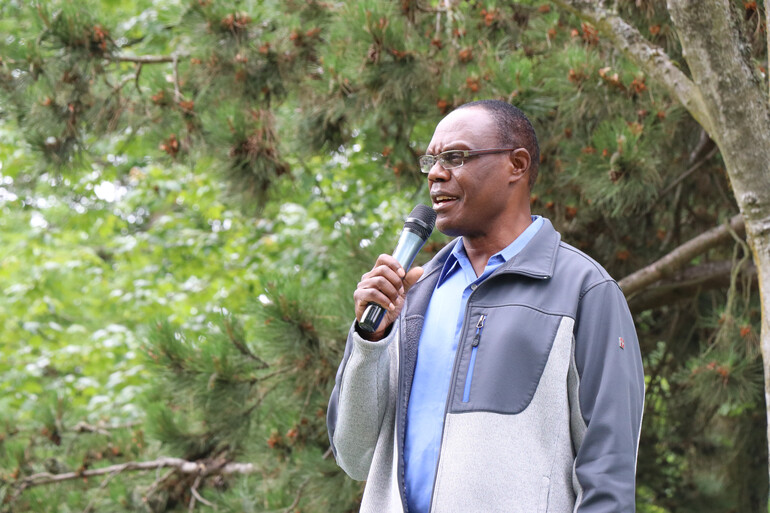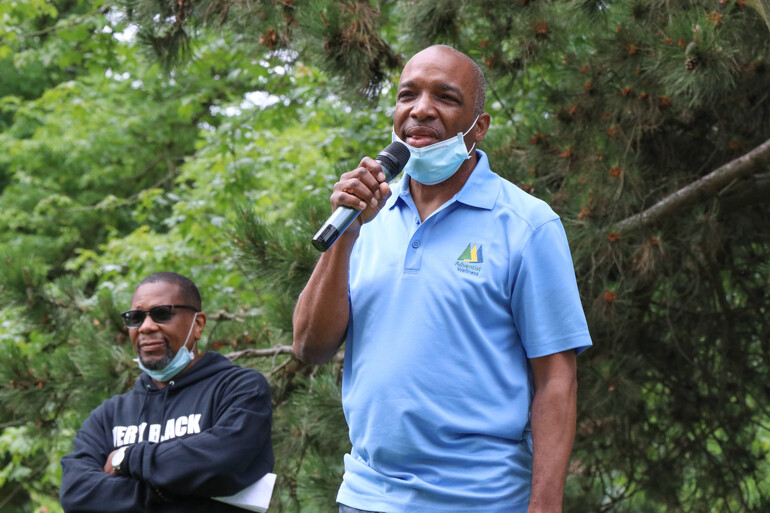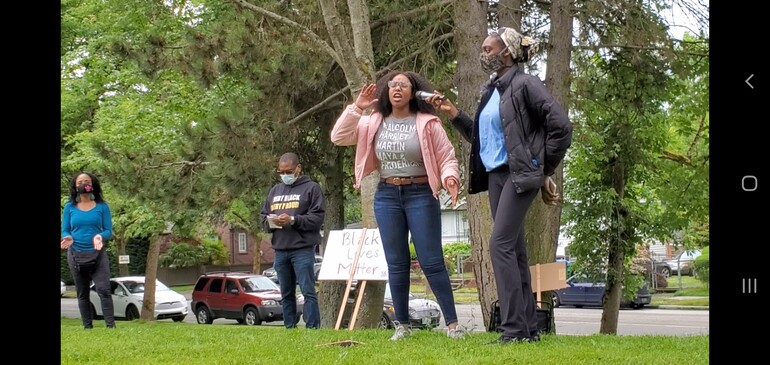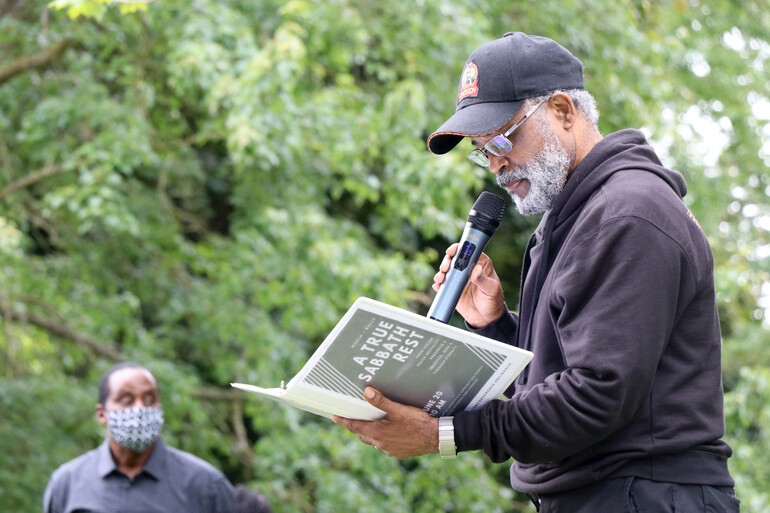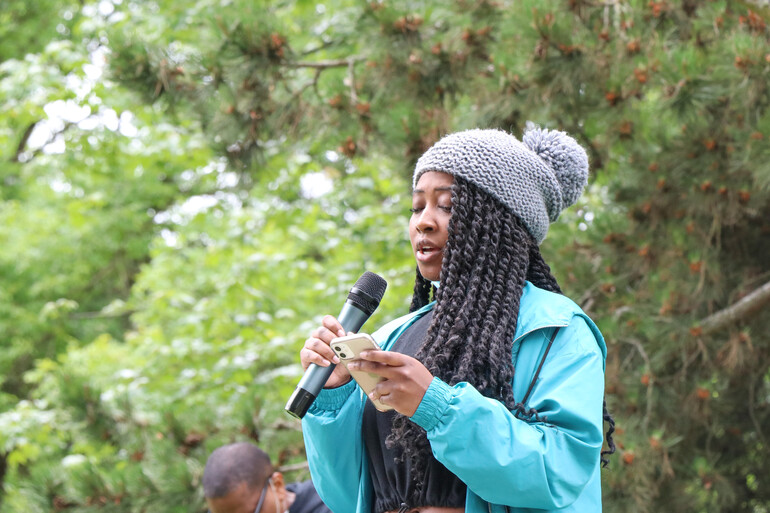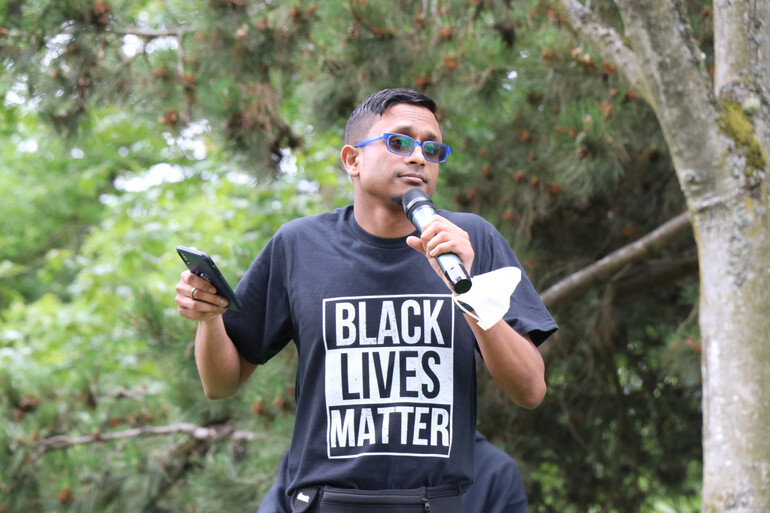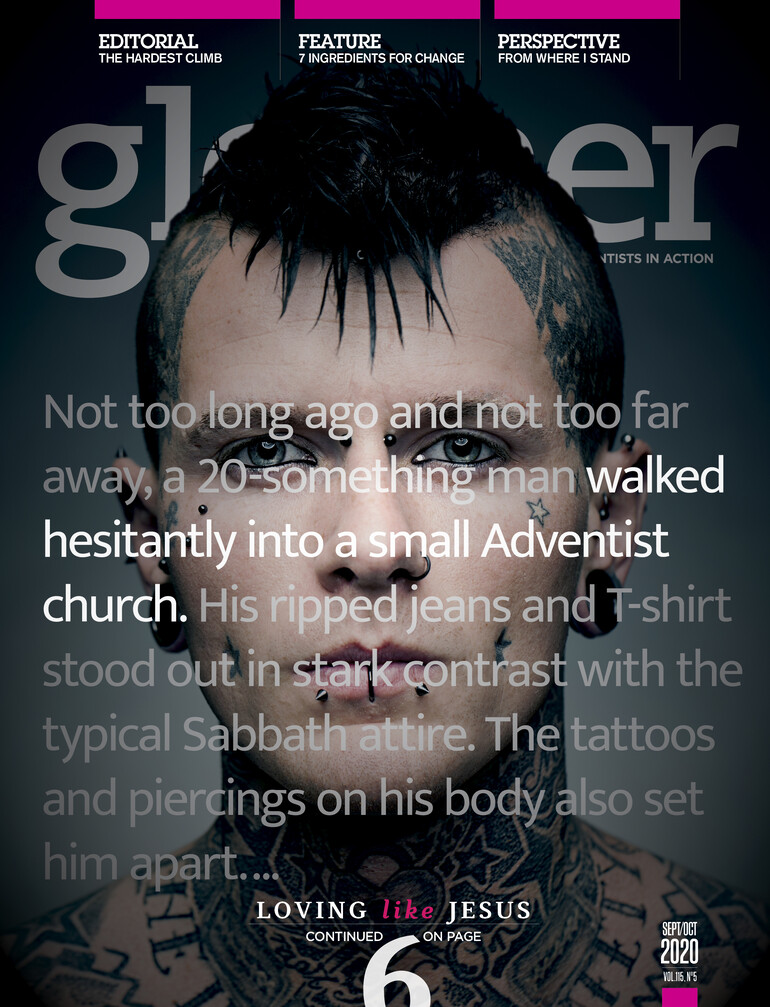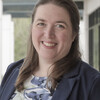How do you minister to a large group of hurting people during coronavirus and racial tensions? You hold a peaceful protest and rally … complete with a police escort along the route.
And what better day to do it than on a Sabbath morning, thought EuGene Lewis, who serves as Washington Conference regional ministries director and Emerald City Community Seventh-day Adventist Church senior pastor.
“As Seventh-day Adventist Christians, we believe in the totality and fulfillment of God’s true Sabbath rest,” Lewis says. “We gathered to show our displeasure, disappointment and dissatisfaction with those who have turned a blind eye to racism and black equality. We need a peaceful pause to seek God’s healing for our community and our church.”
Lewis, accompanied by young adults of the church, led a 14-block march down 23rd Street, across Union Street and finally along Martin Luther King Jr. Way to Barnett Park in Seattle. Following along were more than 300 Adventists from Emerald City, Breath of Life, Maranatha, True Vine, Lighthouse, Ghanaian, Eastside, 24-Seven, Volunteer Park, Auburn Academy, Poulsbo, North Cascade and Washington Conference churches.
“We see this as hugely important for us to be here,” says T.J. McCue, who drove 90 miles with his family to participate in the march and rally. “We believe the church should be more unified in supporting black lives. We couldn’t see not coming.”
Neighbors waved from sidewalks and porches, shopkeepers emerged to take pictures and videos, and drivers in passing cars honked and cheered.
“We are here to show our community that we stand with them in the fight against police brutality, bigotry and injustice,” says Lewis. “We are here to educate our community and church and those who live outside of the diaspora of black life and culture what it means to be black and live in America.”
Once at Barnett Park, a 90-minute outdoor church service began with masked singing of “This Is the Air I Breathe” followed by a series of short speeches from young adults, community leaders, local church leaders and conference leaders.
“Being here today means living out the definition of love,” says marcher Anabelle Quintero from 24-Seven Ministry Center, “and to make sure that we as children of God truly stand up for justice for our black brothers and sisters, and to try to embody what Jesus did for us in protecting us from all sin. We need to do the same for our black brothers and sisters.”
Key Quotes
“African Americans, for some reason, don’t get to enjoy most of the privileges of citizenship. We have black people in this country who do not get the privilege of innocent until proven guilty. Some police officer on the street can pronounce judgment on an individual whether or not they committed a crime. We’re here as Seventh-day Adventist Christians to say enough is enough.” — Andrew Carrington, attorney
“What America is short about is love for one another. If we claim that we love God and we cannot love a person created by God, then our love is short. This means more needs to be done. This country must rise up. The church and the community must rise up. We must confront racism and social discrimination. We have to fight it and be united about it.” — Festus Gumbo, True Vine Fellowship pastor
“Who would’ve thought that I’d be protesting like the people I learned about all those years in history class, and I’d be met with tear gas and rubber bullets for using my voice? How many times do we have to say, 'I can’t breathe …' before you let us up to grasp for air? How many times do we have to say, 'Hands up, don’t shoot …' for you to see we aren’t a threat? How many more black bodies must fall by the wayside before white America will recognize the faults in their systems? How many times will you hear 'no justice, no peace' for your apathy to turn to empathy for the black lives that continue to be taken around you? How many Bible stories do you have to read to realize that you can love Jesus and stand up for the injustices against black people beyond praying for them? In the world, I am black first... but to God I am His first. And if you too call yourself a child of God … why do many find it so hard to speak up and stand up for the unjust treatment of their black brothers and sisters in Christ?” — Kyara Simmons, Emerald City young adult
“Our theme text in the Adventist Church is Rev. 14:6–12, and it represents sharing the gospel with people of every nation, kindred, tongue and language. I believe we don’t have a judgment hour message; we have a justice hour message. There is nothing wrong with protesting on Sabbath. Protesting and compassion [are] built into the very DNA of who we are. So let’s stand up for justice and for peace, for compassion, for our brothers and our sisters. Our movement was born in protest.” — Derek Lane, Maranatha pastor
“Friends, we weren’t there when racism started. But we are here as racism continues. We cannot afford to pass this on to the next generation. It is our responsibility right now to stop this inhuman behavior. Are we going to be witnesses of this cruelty in humanity, or are we going to become advocates to stop this? It is our responsibility as the people who lead today to stop racism.” — Kenneth Omimbi, president of Ugandan community in Washington, Oregon and Idaho
“America tries to push the narrative that we live in a colorblind, post-racial society, but it is evident that we do not. From the wealth gap to mass incarceration, from voter suppression to police brutality, we are far from a United States that is free from racial injustice, discrimination and prejudice. We are more than just an inconvenient piece of America’s history. We are part and parcel, and we are done being silent.” — Alana, Mount Tahoma young adult
“I’ve lived, ministered and worked in Seattle for 30 years. It warms my heart and it gives my heart hope to see all of you standing for the dignity and rights of fellow citizens, some who may perhaps be tired and can no longer stand for themselves.” — Byron Dulan, North Pacific Union Conference vice president
“We can move forward with reconciled hearts. The same challenges of Numbers 12 are happening today. We need to stop, reflect, pray and then move forward because we know black lives matter.” — Doug Bing, Washington Conference president
“The black community right now needs allyship. To be an ally is to stand in the way of oppressive white supremacy that has been demoralizing black people for hundreds of years. To be an ally means that you may need to be ready to be treated just like black people are treated to stand against racial injustice while others passively kneel to worship it. Allies will take the lashes for someone else. We as Christians have more than good reason to stand in the breach for the oppressed. For we believe in a God who left His privilege and incarnated Himself into humanity through His Son Jesus Christ and took the physical and systemic lashes, thus freeing us from the enslavement that sin harbors over humanity. Jesus is the ultimate ally!” — Sam Gungaloo, Eastside Seventh-day Adventist Fellowship pastor
